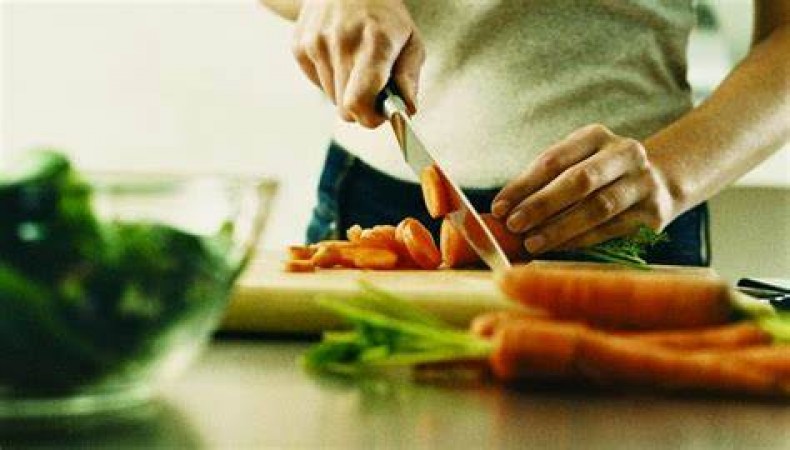
Cooking is an art, and like any other skill, it requires practice, patience, and a keen attention to detail. However, there are several cooking habits that many people unknowingly adopt, which can lead to subpar results, wasted ingredients, and even safety hazards. In this article, we'll dive into 30 terrible cooking habits that you should ditch right away for better culinary outcomes and an enhanced cooking experience.
Neglecting Proper Ingredient Prep
One of the most common terrible cooking habits is failing to prep ingredients adequately. Not having ingredients measured, chopped, and ready before starting can lead to chaos and poor cooking results.
Ignoring Knife Skills
Using a dull knife or incorrect cutting technique can result in uneven cuts and make cooking more time-consuming and less enjoyable.
Disregarding Measurements
Cooking is part art, part science. Ignoring precise measurements can lead to imbalanced flavors and ruined dishes.
Cooking on High Heat Always
While high heat can be useful, not every dish benefits from it. Using high heat constantly can lead to burnt food and lost nutrients.
Overcrowding the Pan
Overcrowding the cooking pan can prevent proper browning and steaming, resulting in food that's less flavorful and appealing.
Neglecting Seasoning Layers
Seasoning at different stages of cooking adds depth to flavors. Skipping this can leave your dish tasting one-dimensional.
Skipping Resting Time
Allowing meat to rest after cooking helps retain juices. Skipping this step can result in dry and less appetizing meat.
Using Dull Kitchen Tools
Dull knives and outdated utensils can make cooking frustrating and unsafe. Invest in quality tools for a smoother experience.
Not Reading the Recipe Thoroughly
Skipping steps or not understanding the recipe before starting can lead to mistakes and disappointment in the final outcome.
Multitasking Unnecessarily
Cooking requires focus. Multitasking too much can lead to errors and overcooked or burned food.
Poor Food Storage
Improperly storing ingredients can lead to spoilage and foodborne illnesses. Invest in proper storage containers and methods.
Cross-Contaminating Ingredients
Not cleaning surfaces and utensils between handling different ingredients can lead to contamination and health risks.
Neglecting Food Safety Guidelines
Ignoring basic food safety practices, like washing hands and using separate cutting boards for raw meats, can lead to foodborne illnesses.
Avoiding New Ingredients
Sticking to the same ingredients limits culinary exploration. Embrace new ingredients to enhance your cooking skills.
Overcomplicating Simple Dishes
Sometimes, simplicity is key. Overcomplicating dishes with too many ingredients can lead to overwhelming flavors.
Using Low-Quality Ingredients
Quality ingredients elevate your dishes. Skimping on ingredients can result in lackluster meals.
Not Tasting as You Go
Tasting your food throughout the cooking process allows you to adjust flavors and seasonings as needed.
Overcooking Vegetables
Overcooked vegetables lose their vibrant colors and essential nutrients. Cook them just until tender for the best results.
Skipping Homemade Stocks
Homemade stocks add depth to dishes. Skipping them can lead to bland soups and sauces.
Using Too Much Oil
Excessive oil can make dishes greasy and unhealthy. Use oil in moderation for better results.
Neglecting Your Senses
Cooking engages all senses. Ignoring how food looks, smells, and sounds can lead to underwhelming results.
Over-Seasoning or Under-Seasoning
Balancing seasoning is crucial. Over- or under-seasoning can overpower or weaken the flavors of your dish.
Relying Heavily on Microwaves
While microwaves are convenient, they don't always yield the best results. Use them for reheating rather than cooking.
Impatience with Baking
Baking requires precision and patience. Rushing the process can result in uneven textures and disappointing desserts.
Inadequate Meal Planning
Lack of meal planning leads to last-minute decisions and subpar meals. Plan ahead for more enjoyable cooking experiences.
Not Cleaning as You Cook
A messy kitchen can hinder your cooking flow. Clean as you go to maintain an organized workspace.
Fearing Culinary Creativity
Don't be afraid to experiment. Embrace your culinary creativity to discover new flavors and dishes.
Disregarding Presentation
Presentation matters. Neglecting how your dish looks can diminish your overall dining experience.
Not Adapting to Mistakes
Mistakes happen. Instead of giving up, learn from them and adapt to create better dishes next time.
Rushing the Cooking Process
Cooking is a process that takes time. Rushing can result in undercooked food and disappointment.
By breaking free from these terrible cooking habits, you'll elevate your culinary skills and create dishes that are not only delicious but also visually appealing. Remember, cooking is an ongoing learning experience, and embracing a few changes can lead to remarkable improvements in your kitchen adventures.
Mushroom Lover's Paradise: Matar Mushroom Curry